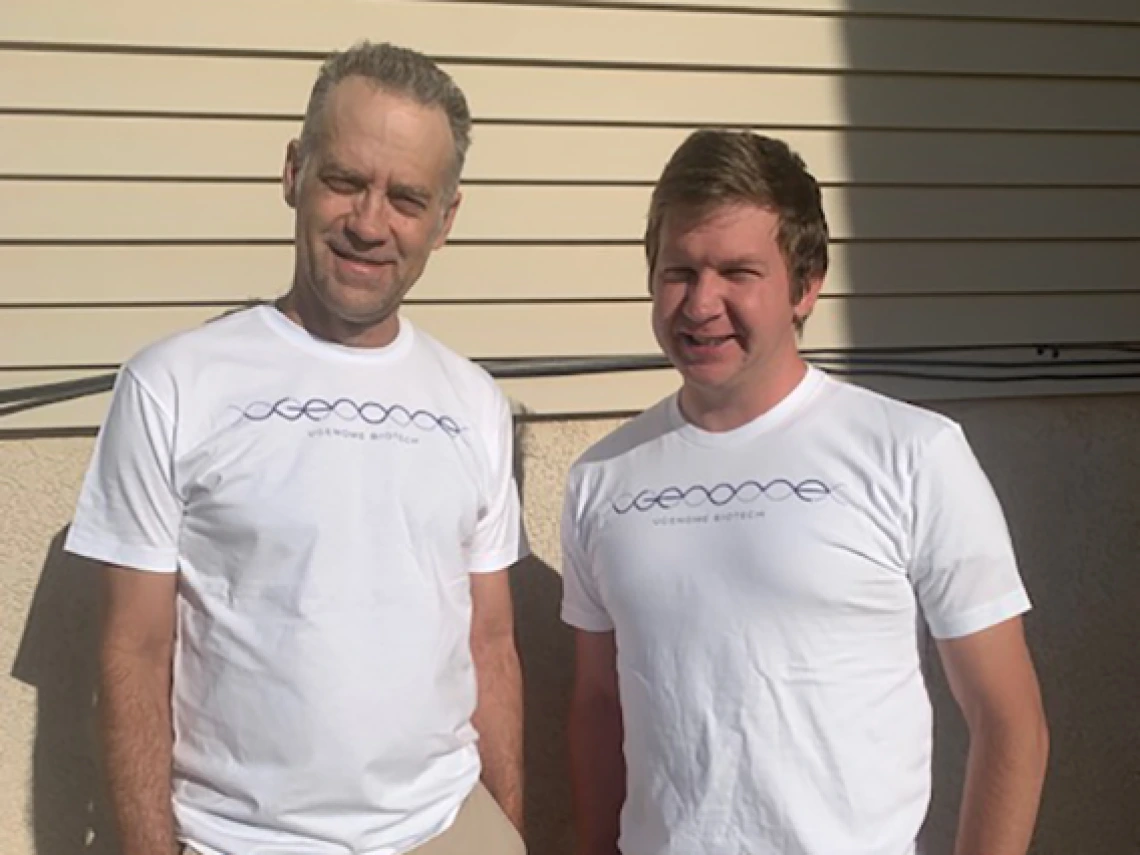Startup targets .1% of human genetics for personalized, precision-based therapies
System developed by a PhD student is now the foundation of a new company UGenome.

Left to right: Zach Brooks and Adam Grant.
Zach Brooks
TUCSON, AZ – Precision medicine is often talked about as an ideal, but in practice, it is still an early-stage field. Today, healthcare providers are a step closer to being able to precisely target therapies for those who will benefit most based on their genetic makeup thanks to a new technology developed at the University of Arizona and being advanced into the world through Tucson startup UGenome.
Adam Grant, while a doctoral student in the university’s Cancer Biology Program at the UArizona Cancer Center offered through Graduate Interdisciplinary Programs, developed the platform that UGenome’s team has developed to generate predictable and interpretable drug response models via probabilistic networks. These kinds of networks allow for the representation and understanding of the dependent and independent relationships between random variables. As an example, given a patient and a set of symptoms, a network of this kind can be used to figure out the probability that the patient has a given disease or combination of diseases, or to determine the ideal treatment option given the patient’s genetic profile.
Zach Brooks (’16) is the chief executive officer of the startup. He has previous experience with five other startups, three of which were launched out of the University of Arizona. He received his doctorate in applied linguistics from the College of Humanities and the College of Science.
“Ideally,” Brooks said, “these models will be used to enhance cancer therapeutics by better identifying which treatment regimen a cancer patient should receive based on the molecular profile of their tumor.”
Grant originally called the software he created MAXX, which stands for Mutation Allelic Expression Extractor. While the name is complex, the premise is relatively straightforward.
Targeting the .1%
In general, therapies are developed and selected because they are broad in their scope; they are based on the fact that all humans have 99.9% of our genetics in common, and those work within that baseline.
Alternatively, Grant asked a different question: What if a specific therapy at a specific dosage works that much better for patients with a specific variation in that other .1% of their genetic makeup?
This is where the system licensed to UGenome excels; it improves how doctors are able to select and personalize therapies for diseases based on the patient’s unique genetics.
From Innovation to Impact
While Grant had not initially planned on a commercial path for his work, he did want to see it get out into the world where it could help others. He worked with Tech Launch Arizona (TLA), the unit of the UArizona that commercializes inventions stemming from research, to protect the intellectual property, recruit an experienced CEO for the startup, and license the technology to the new company. The TLA team provided a variety of support services to the startup team, including leadership mentoring and business strategy development. Through the NSF I-Corps program run through TLA, the UGenome team also received coaching and mentoring to help them identify the groups of customers who would benefit most from the system – and thus be able to generate the most impact for doctors and patients.
“As it turns out,” said Brooks, “our ideal customers are contract research organizations or CROs, such as companies working on rare genetic disorders, pharmaceutical and drug developers, and companies doing clinical assessments – such as oncology trials – to see how well new therapies are working. “In our first three projects, we have analyzed data for breast cancer and anti-inflammatory responses, while developing a suite of pharmacogenomic tools.”
Along with Brooks, the UGenome team includes computational biologists Suraj Sakaram and Rushika Pandya; pharmacogenomics pharmacist Jayden Lee, PharmD; Peter Bannister, DPhil (Engineering, Oxford) and an advisory board and team from five continents that include Jeff Jenkins (Neuro-ID), Hanna McHugh (Abbott Laboratories), and Gondy Leroy, Associate Dean for Research at the Eller College of Management.

